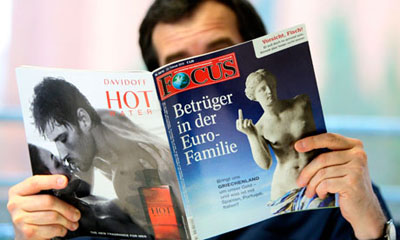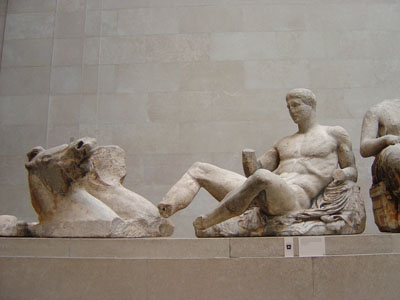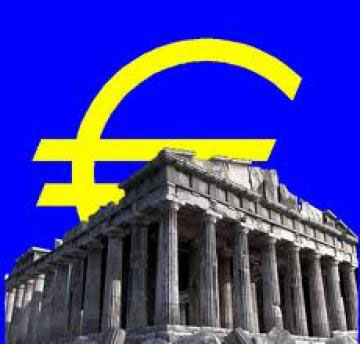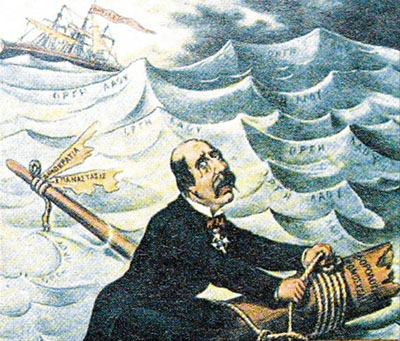“Till when brave fellows will you submit to all this…?”
The unprecedented attack against Greece and the Greeks on the part of German followed by many other European nations entirely uncritically with populist fanaticism, bordering on lynching has the nature of heaping on the shoulders of one example of wrongdoing innumerable others and therefore hiding their own.
The Greek insecurity and the Eurozone
The facts are simple. A Greek Prime minister following the trend and with personal ambition brought `Greece into the Eurozone by secretly contracting a loan with a loan shark institution Goldman Sachs, and thus being able to present the Greek deficit 4 points lower, instead of 10% of Gross product, at 6%, which made Greece eligible for entering the Eurozone. This was of course totally wrong, and showed on the part of the Greek Government a haste due to chronic insecurity both political and economic which has beset Greece since its independence in 1831, then in absolute ruins and hunger on account of the 10 year old War of Independence.
This psychology of a destitute and endangered nation has never died out in the average Greek and even in the elite, political or intellectual.
“A subconscious resentment
of modern Greece and the Greeks
underlies the recent
German media attacks”
 This was particularly intensified after the disastrous expedition and defeat in Asia Minor in 1922, and of course under the total annihilation of everything by the Germans who destroyed the country turning it into a Belsen of hunger and stripping it of all wealth and industries, apart from the incredible massacres of men women and children in reprisals and burning of innumerable villages. No other European country suffered such devastation with almost half a million dead and was never given any war reparations. According to the Americans it would have jeopardized the German economic recovery, since they owed us then at least 19 billion euros, today over a 180b, with interest.
This was particularly intensified after the disastrous expedition and defeat in Asia Minor in 1922, and of course under the total annihilation of everything by the Germans who destroyed the country turning it into a Belsen of hunger and stripping it of all wealth and industries, apart from the incredible massacres of men women and children in reprisals and burning of innumerable villages. No other European country suffered such devastation with almost half a million dead and was never given any war reparations. According to the Americans it would have jeopardized the German economic recovery, since they owed us then at least 19 billion euros, today over a 180b, with interest.
All this happened because the Greeks were the only people that resisted actively as a nation the Axis and retarded by a month the attack on Russia causing their ultimate defeat. The winter and Russian counter- attacks did the rest, so that Moscow was not taken, neither Leningrad. This is known to all Germans and they have passed on this knowledge to the younger generation. A subconscious resentment of modern Greece and the Greeks underlies the recent German media attacks, and of course added to it, the official guilt in denial.
The Greek culture and the Western heirs
This does not date from yesterday but has a long history from the Middle ages and the Renaissance when the Latin and Germanic West discovered or re- discovered the forgotten Greek Civilization only gleaned through Latin Texts during the Middles ages. The discovery so dazzled the Greekless Europeans, that they incorporated the Greek letters and art in one short century around 1450-1550, when the refugee byzantine scholars fleeing the Turks, brought over the manuscripts and taught them the language. Because of the religious split dating since 800 A.D. between the Catholic and Orthodox Churches, the Byzantines were not welcome and abandoned to the Turks after the first Crusade in 1099 captured Jerusalem. And not only but the Latins in 1201, captured looted and devastated Constantinople, installing many Frankish Principalities in Greece. Gibbon even voices a strong distaste for their refugee scholars teaching Greek in the 15th century shortly before and after the fall of Constantinople to the Ottoman Turks in 1453…
“The modern Greeks were just
a nuisance, an interpolation
in the love affair of the
West with classical Greece”
 From then on the West has always thought of itself as the only authentic heirs of the Greeks. The modern Greeks were just a nuisance, an interpolation in their love affair with classical Greece. The fact that they spoke the same language developed for 4000 years with two written scripts was not a miracle but a scandal. An anomaly. Since Alexandrian times those in the Catholic Church who knew Greek had in the meanwhile translated the Old Testament in Latin, later ignoring the Greek translation, which was however just under 2000 years old, from Alexandrian times, and which is the language we still speak. The Koine. I know of very few classical scholars who ever bothered to learn modern Greek. What is there to read after Homer, Aeschylus, Socrates, Plato and Aristotle, in Greek? Perhaps just the Church Fathers, or the hymns of Romanos, at a stretch the Chronicle of Michael Psellos. Negligable the whole of the Byzantine era of 1000 years to the fanatic classical scholars. Today Psellos of the 10th century is the rare chronicler read in translation, with Anna Comnena’s “Alexiad”, in Penguin editions.
From then on the West has always thought of itself as the only authentic heirs of the Greeks. The modern Greeks were just a nuisance, an interpolation in their love affair with classical Greece. The fact that they spoke the same language developed for 4000 years with two written scripts was not a miracle but a scandal. An anomaly. Since Alexandrian times those in the Catholic Church who knew Greek had in the meanwhile translated the Old Testament in Latin, later ignoring the Greek translation, which was however just under 2000 years old, from Alexandrian times, and which is the language we still speak. The Koine. I know of very few classical scholars who ever bothered to learn modern Greek. What is there to read after Homer, Aeschylus, Socrates, Plato and Aristotle, in Greek? Perhaps just the Church Fathers, or the hymns of Romanos, at a stretch the Chronicle of Michael Psellos. Negligable the whole of the Byzantine era of 1000 years to the fanatic classical scholars. Today Psellos of the 10th century is the rare chronicler read in translation, with Anna Comnena’s “Alexiad”, in Penguin editions.
“This is the Greece the
German press and many of
their officials call lazy
useless beach comers”
As for the recent attacks, they are not new, but were vaguer in the past. Mainly satires of the new Greek State and country by French authors, such as Edmond About’s, “The King of the Mountains”, on greek brigands, and other books of this kind, well cataloged and discussed in Sophie Basch’s exceptional book “Le Mirage Grec.” (Hatier /Kaufmann,1995). This type of 19th century book was later counteracted by J.C. Lawson, “Modern Greek Folklore and the Ancient Religion” which connected the Greek people of today with their ancient past. This emergence of the past in the present has something miraculous. It is an epiphany as James Joyce called it. A banal event in daily life that gets somehow isolated in the mind of the observer into something fraught with significance, a street conversation for example between a man and a woman. The Surrealists after Salvador Dali called this phenomenon of the intrusion of the imaginary into daily life “The paranoical -critical method”, and based their choice of objets either found or constructed on this method, expressing desire. The work of many poets of the 1930’s in Greece answers to that interpenetration of the ancient with the modern, such as the later work of Andreas Embirikos, translated in English as “Amour Amour”, the prose poems and paintings of Nikos Engonopoulos, the poem “Amorgos” of Nikos Gatsos, the poetry of Odysseus Ellytis, with forerunner the bardic hermetic poet Angelos Sikelianos and the novel “Eroica” of Cosmas Poltis based on the Iliad as reference, as the “Ulysses” of Joyce was based on the Odyssey, and much of the poetry of George Seferis, such as the “Mythistorema” with forerunner the historical poems of C.P. Cavafy.
This is the Greece the German press and many of their officials call lazy useless beach comers. If art is useless what are ideological movements that end in catastrophes such as Nazism? Art has never destroyed the world but brought enjoyment and stimulated thought and emotions.
“The Greece of today is
a country that has come out of
500 years of Ottoman slavery”
 The Greece of today is a country that has come out of 500 years of Ottoman slavery. For all those years the life of Greeks hung on a thread. Some of my own ancestors had their heads cut off, and from my grandmother’s family 6 lost their heads in 30 years before the Greek Insurrection of 1821. No wonder modern Greeks have in their DNA the sleepless reactions of hunted animals. They are born with shot nerves in spite of the change of circumstances. This memory does not die out. If we add to this the merciless Occupation of the Nazis in WWII, and the brutal civil war that followed, and the uprooting earlier in 1922 of the Greek population of Asia Minor after a military defeat, and the dictatorships of 1935-41 and of 1967-1974, present day Greeks have lots of reasons to feel insecure and nervous, uncertain of their so called friends, with hostile neighbors, east and north, having to spend huge sums for armaments, and now the whole of the European Union especially in the north casting them in the role of villains one and all. No wonder Greece came out broke from the adventure in the Eurozone which she joined in 2004, and the huge expense to keep up their pride with the Olympic Games. Those two add up to 50 billion of the present debt.
The Greece of today is a country that has come out of 500 years of Ottoman slavery. For all those years the life of Greeks hung on a thread. Some of my own ancestors had their heads cut off, and from my grandmother’s family 6 lost their heads in 30 years before the Greek Insurrection of 1821. No wonder modern Greeks have in their DNA the sleepless reactions of hunted animals. They are born with shot nerves in spite of the change of circumstances. This memory does not die out. If we add to this the merciless Occupation of the Nazis in WWII, and the brutal civil war that followed, and the uprooting earlier in 1922 of the Greek population of Asia Minor after a military defeat, and the dictatorships of 1935-41 and of 1967-1974, present day Greeks have lots of reasons to feel insecure and nervous, uncertain of their so called friends, with hostile neighbors, east and north, having to spend huge sums for armaments, and now the whole of the European Union especially in the north casting them in the role of villains one and all. No wonder Greece came out broke from the adventure in the Eurozone which she joined in 2004, and the huge expense to keep up their pride with the Olympic Games. Those two add up to 50 billion of the present debt.
“The curse of being Greek
resembles that of being Jewish.
Mishellenism and anti-Semitism
are connected phenomena”
The curse of being Greek resembles that of being Jewish. Europeans owe their civilization and religion to both these cultures and have not forgiven their descendents. A kind of deep Freudian resentment of the parent cultures analyzed in two remarkable books by S. Freud, “Totem and Taboo”, and “Moses and Monotheism”. Mishellenism and anti-Semitism are connected phenomena, and have their roots in the Roman Empire, who dispersed the Jewish people and called the Greeks graeculi, a pejorative term, although they looted their art and appropriated their culture. But culture and language have a way of returning to dominate their conquerors. The Byzantine Empire became after a couple of centuries Greek speaking, and writing, with Latin relegated to the codes of law. Had it not been for the Turkic nomadic and warlike tribes of central Asia, the Byzantine Eastern Europe and Asia Minor would have been a source of civilization surpassing that of medieval Western Europe. But Greeks had not only one foe from the east but the barbaric barons of feudal Europe who invaded looted and oppressed a weakened Empire. A clash of religions also with the Catholic Popes encouraged expeditions and plunder especially in 1201, when 4th Crusade took Constantinople, instead of the Holy Lands.
All this is not forgotten by contemporary Greeks, and the choice between the Turban and the papish Tiara was often an excruciating dilemma for generations of Greeks, as to whom to choose to be under.
Does all this come as a surprise to western and northern Europeans who seem to have a short memory of the crimes and grasping behavior of their ancestors, and not only of their immediate predecessors. History has a way of being immovable where prejudices are concerned. I have often encountered them in unexpected quarters even of cultivated mileus. They die hard. What I am recounting is not nationalism. It is the hard facts of history found in any textbook however interpreted.
“The words Hellene Hellas
have a magic power and have entered
into the European subconscious”
 Of course The Greeks had always counted friends. From Lord Byron, and Victor Hugo, Lamartine, Delacroix, the most famous ones, to many anonymous and sincere people of today. The words Hellene, Hellas have a magic power and have entered into the European subconscious. To try to undo it proves to be a near impossible task, although many have tried in recent years in the name of p.c. and other ideologies more or less transient, some social and others even scientific, and humanistic. Every age knows its Greece and Greeks in a different manner.
Of course The Greeks had always counted friends. From Lord Byron, and Victor Hugo, Lamartine, Delacroix, the most famous ones, to many anonymous and sincere people of today. The words Hellene, Hellas have a magic power and have entered into the European subconscious. To try to undo it proves to be a near impossible task, although many have tried in recent years in the name of p.c. and other ideologies more or less transient, some social and others even scientific, and humanistic. Every age knows its Greece and Greeks in a different manner.
That is something to reckon with. Periods of high esteem have been followed by periods of low esteem. This is only natural if canons are extracted each time differently. The high Renaissance discovered Plato and Homer, Aeschylus, Herodotos and Plutarch, from Marsilio Ficino 1450-1550, to Chapman, two great translators, respectively of Homer and Plato, Rabelais, Montaigne, Erasmus, Thomas More, Cervantes, the Elisabethans and Shakespeare the humanists, the metaphysical poets John Donne, Andrew Marvel, until Blake and the Romantics, Shelley, Keats, Tennyson etc, From 165O-1750, the neoclassical era, Racine, Corneille, Boileau, Dryden, Pope, with Sophocles and Euripides from 1750-1850, the German English French Romantics, as well as Rabelais, Shakespeare, Montaigne, rediscover Homer and Aeschylus, and also the Modernists,with Joyce, Pound Eliot, and Louis Macneice, who emphasize the Metaphysical poets.
Then came the tabula rasa of all classical heritage, the futurists, dadaists, and partly the Surealists. This fluidity of emphasis took in and out many Greeks. Such as Plotinus, the Neoplatonists, Aristophanes, Lucian, satire etc. Classical canons, revolts, decadence, the Alexandrians, Symbolists, even the avaunt-garde the Greek marble heads reappear in De Chirico, and Italian metaphysical painters. Greece was always somewhere around the corner, to be put down. “Greece never existed” (Andre Breton), and now from heroes to villains, contradictory, like in Nietsche’s Apollo and Dionysos, or in the “Greeks and the Irrational of Dodds”, from James Frazer to Jane Harisson. F.M Cornford and Gilbert Murray for the use of Modernists, and finally in the “Ulysses” and “Finnegan’s Wake”, of James Joyce, with behind them respectively, the Odyssey and the Iliad. The themes of Roaming (wanderlust) and War.
“The name Greece has a way of
becoming a double edged weapon
when negated. It may turn
against them”
 The Germans some of the first to come under the spell of Greek art and civilization, made a serious mistake when they attempted to degrade modern Greece. The name alone has a way of becoming a double edged weapon for the negated. It may turn against him. Because you do not degrade a people who are vulnerable but an ancient civilization that has inserted itself in the conscious and subconscious of all Europeans. In fact such an attack is on themselves and all they believe in. So if you talk of an European family you cannot cross out Greece, as has often been tried. The very roots of today’s Europe reach back to Greece and the strange break it created with the Theocratic civilizations of Egypt and Mesopotamia however great, they were, by inventing Freedom. The freedom of the states, the individuals, of thought and the creative mind.
The Germans some of the first to come under the spell of Greek art and civilization, made a serious mistake when they attempted to degrade modern Greece. The name alone has a way of becoming a double edged weapon for the negated. It may turn against him. Because you do not degrade a people who are vulnerable but an ancient civilization that has inserted itself in the conscious and subconscious of all Europeans. In fact such an attack is on themselves and all they believe in. So if you talk of an European family you cannot cross out Greece, as has often been tried. The very roots of today’s Europe reach back to Greece and the strange break it created with the Theocratic civilizations of Egypt and Mesopotamia however great, they were, by inventing Freedom. The freedom of the states, the individuals, of thought and the creative mind.
“I believe the neoliberal theorists of
austerity measures including cutting
of salaries and pensions is simply
putting the cart before the horse”
The main criticism voiced against Greece is that it is a malfunctioning clientelist democracy with an inflated public sector which swallows an enormous amount of money which is obtained from loans since the local tax system is not able to reach the privileged class of mainly big and medium business and free professions, while at the same time taxing to death the middle and poorer classes. The reason for this inequality is that since the country has no productive growth in any case, like heavy and light industry but depends only on agricultural production, services and tourism not enough money can ever be culled to balance the budget or even to pay for current expenses. However the neoliberal ideology insists that what must come first is restructuring the State by privatizing and reducing the number of public employees to create a more competitive and modern system.
I believe the neoliberal theorists of austerity measures including cutting of salaries and pensions is simply putting the cart before the horse. What they name reckless spending did not take into consideration the existing social conditions under which poor and non productive countries labour to make ends meet. Without jobs and growth a large number of the population including the private sector ones would live in a state of total or near poverty. With austerity measures and no jobs to spend money the economy of such countries cannot survive. The opposite argument is that first you must adress the problem of poverty, under developement, lack of special skills, technical advance that provide income for small poor countries like South Korea, for instance with emphasis on education, training and growth. Before you reduce the public sector you must realize you are killing the economy and the way it functioned. That is killing the patient with the cure that must come after the encouragement of growth. Otherwise a bad state of affairs simply becomes catastrophic as we see today in Greece.
Of course the left political parties always have a standard argument. It is the fault of the capitalist system. But that is not entirely so . It is also the fault of lack of foresight of the political elite who discourage production in favor of easier import policy which is highly taxed and provides temporary revenue. While often the business sector tries to make production the first endeavor and start a business it hits upon the bloated bureaucracy, which in its entrenchment lives off the loan system, until it collapses as now in Greece. So the dogmatic left under the circumstances makes the right emphasis on poverty but forgets the reasons which are not only economic but also psychological, and political, a wrong choice.
“Recently this has been named
catastrophic capitalism.
Till when brave fellows
will you submit to all this…? ”
 The consequences of this state of affairs is stagnation not only economic but also intellectual, of a bright people forced to live as the worst ex colonies at the mercy of the economic sharks and powerful interests of foreign states, as a dependent, who is to be treated close to what I would call a slave state, that recycles their production with loans given by institutions they themselves own and activate such as the weapons industry which accounts of much of the 50 billion of loan money Greece obtains, according to recent calculations due to special circumstances of neighborhood with a hostile state, Turkey continually antagonistic and aggressive. This gives the occasion of many foreign powers to sell us weapons recycling as it were their loans with interest. This began in 1821 when the Greek Government asked for loans given with interest withheld beforehand in other words only half or two thirds of the sum owed and when the Greeks later ordered two steamships in New York they were sabotaged and never delivered
The consequences of this state of affairs is stagnation not only economic but also intellectual, of a bright people forced to live as the worst ex colonies at the mercy of the economic sharks and powerful interests of foreign states, as a dependent, who is to be treated close to what I would call a slave state, that recycles their production with loans given by institutions they themselves own and activate such as the weapons industry which accounts of much of the 50 billion of loan money Greece obtains, according to recent calculations due to special circumstances of neighborhood with a hostile state, Turkey continually antagonistic and aggressive. This gives the occasion of many foreign powers to sell us weapons recycling as it were their loans with interest. This began in 1821 when the Greek Government asked for loans given with interest withheld beforehand in other words only half or two thirds of the sum owed and when the Greeks later ordered two steamships in New York they were sabotaged and never delivered
The money going to profiteers. This is a reminder that the Germans only recently were delivering us faulty submarines that leaned and tanks without replacement parts or ammunition. Till when brave fellows will you submit to that…? Recently this has been named catastrophic capitalism.
Nanos Valaoritis
Athens, March 15 2012
About Nanos Valaoritis
http://en.wikipedia.org/wiki/Nanos_Valaoritis




As a former student of Professor Valaoritis at San Francisco State, while reading this I felt like I was in his class again, hearing his effortless improvisations on profound themes. Bravo!